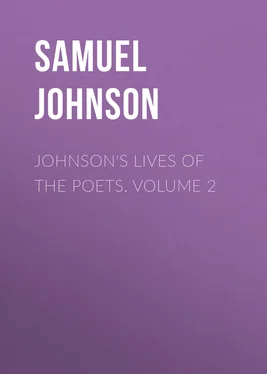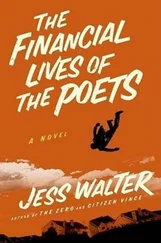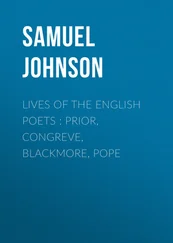Samuel Johnson - Johnson's Lives of the Poets. Volume 2
Здесь есть возможность читать онлайн «Samuel Johnson - Johnson's Lives of the Poets. Volume 2» — ознакомительный отрывок электронной книги совершенно бесплатно, а после прочтения отрывка купить полную версию. В некоторых случаях можно слушать аудио, скачать через торрент в формате fb2 и присутствует краткое содержание. Издательство: Иностранный паблик, Жанр: foreign_poetry, literature_18, Поэзия, foreign_antique, foreign_prose, на английском языке. Описание произведения, (предисловие) а так же отзывы посетителей доступны на портале библиотеки ЛибКат.
- Название:Johnson's Lives of the Poets. Volume 2
- Автор:
- Издательство:Иностранный паблик
- Жанр:
- Год:неизвестен
- ISBN:нет данных
- Рейтинг книги:5 / 5. Голосов: 1
-
Избранное:Добавить в избранное
- Отзывы:
-
Ваша оценка:
- 100
- 1
- 2
- 3
- 4
- 5
Johnson's Lives of the Poets. Volume 2: краткое содержание, описание и аннотация
Предлагаем к чтению аннотацию, описание, краткое содержание или предисловие (зависит от того, что написал сам автор книги «Johnson's Lives of the Poets. Volume 2»). Если вы не нашли необходимую информацию о книге — напишите в комментариях, мы постараемся отыскать её.
Johnson's Lives of the Poets. Volume 2 — читать онлайн ознакомительный отрывок
Ниже представлен текст книги, разбитый по страницам. Система сохранения места последней прочитанной страницы, позволяет с удобством читать онлайн бесплатно книгу «Johnson's Lives of the Poets. Volume 2», без необходимости каждый раз заново искать на чём Вы остановились. Поставьте закладку, и сможете в любой момент перейти на страницу, на которой закончили чтение.
Интервал:
Закладка:
Having already translated some parts of Lucan's "Pharsalia," which had been published in the Miscellanies, and doubtless received many praises, he undertook a version of the whole work, which he lived to finish, but not to publish. It seems to have been printed under the care of Dr. Welwood, who prefixed the author's life, in which is contained the following character:—
"As to his person, it was graceful and well made; his face regular, and of a manly beauty. As his soul was well lodged, so its rational and animal faculties excelled in a high degree. He had a quick and fruitful invention, a deep penetration, and a large compass of thought, with singular dexterity and easiness in making his thoughts to be understood. He was master of most parts of polite learning, especially the classical authors, both Greek and Latin; understood the French, Italian, and Spanish languages, and spoke the first fluently, and the other two tolerably well. He had likewise read most of the Greek and Roman histories in their original languages, and most that are wrote in English, French, Italian, and Spanish. He had a good taste in philosophy; and, having a firm impression of religion upon his mind, he took great delight in divinity and ecclesiastical history, in both of which he made great advances in the times he retired into the country, which was frequent. He expressed on all occasions his full persuasion of the truth of revealed religion; and, being a sincere member of the Established Church himself, he pitied, but condemned not, those that dissented from it. He abhorred the principles of persecuting men upon the account of their opinions in religion; and, being strict in his own, he took it not upon him to censure those of another persuasion. His conversation was pleasant, witty, and learned, without the least tincture of affectation or pedantry; and his inimitable manner of diverting and enlivening the company made it impossible for any one to be out of humour when he was in it. Envy and detraction seemed to be entirely foreign to his constitution; and whatever provocations he met with at any time, he passed them over without the least thought of resentment or revenge. As Homer had a Zoilus, so Mr. Rowe had sometimes his; for there were not wanting malevolent people, and pretenders to poetry too, that would now and then bark at his best performances; but he was so conscious of his own genius, and had so much good-nature, as to forgive them, nor could he ever be tempted to return them an answer.
"The love of learning and poetry made him not the less fit for business, and nobody applied himself closer to it when it required his attendance. The late Duke of Queensberry, when he was Secretary of State, made him his secretary for public affairs; and when that truly great man came to know him well, he was never so pleased as when Mr. Rowe was in his company. After the duke's death, all avenues were stopped to his preferment; and during the rest of that reign he passed his time with the Muses and his books, and sometimes the conversation of his friends. When he had just got to be easy in his fortune, and was in a fair way to make it better, death swept him away, and in him deprived the world of one of the best men, as well as one of the best geniuses, of the age. He died like a Christian and a philosopher, in charity with all mankind, and with an absolute resignation to the will of God. He kept up his good-humour to the last; and took leave of his wife and friends, immediately before his last agony, with the same tranquillity of mind, and the same indifference for life, as though he had been upon taking but a short journey. He was twice married—first to a daughter of Mr. Parsons, one of the auditors of the revenue; and afterwards to a daughter of Mr. Devenish, of a good family in Dorsetshire. By the first he had a son; and by the second a daughter, married afterwards to Mr. Fane. He died 6th December, 1718, in the forty-fifth year of his age, and was buried on the 19th of the same month in Westminster Abbey, in the aisle where many of our English poets are interred, over against Chaucer, his body being attended by a select number of his friends, and the dean and choir officiating at the funeral."
To this character, which is apparently given with the fondness of a friend, may be added the testimony of Pope, who says, in a letter to Blount, "Mr. Rowe accompanied me, and passed a week in the Forest. I need not tell you how much a man of his turn entertained me; but I must acquaint you, there is a vivacity and gaiety of disposition, almost peculiar to him, which make it impossible to part from him without that uneasiness which generally succeeds all our pleasure."
Pope has left behind him another mention of his companion less advantageous, which is thus reported by Dr. Warburton:—
"Rowe, in Mr. Pope's opinion, maintained a decent character, but had no heart. Mr. Addison was justly offended with some behaviour which arose from that want, and estranged himself from him, which Rowe felt very severely. Mr. Pope, their common friend, knowing this, took an opportunity, at some juncture of Mr. Addison's advancement, to tell him how poor Rowe was grieved at his displeasure, and what satisfaction he expressed at Mr. Addison's good fortune, which he expressed so naturally that he (Mr. Pope) could not but think him sincere. Mr. Addison replied, 'I do not suspect that he feigned; but the levity of his heart is such, that he is struck with any new adventure, and it would affect him just in the same manner if he heard I was going to be hanged.' Mr. Pope said he could not deny but Mr. Addison understood Rowe well."
This censure time has not left us the power of confirming or refuting; but observation daily shows that much stress is not to be laid on hyperbolical accusations and pointed sentences, which even he that utters them desires to be applauded rather than credited. Addison can hardly be supposed to have meant all that he said. Few characters can bear the microscopic scrutiny of wit quickened by anger; and, perhaps, the best advice to authors would be, that they should keep out of the way of one another.
Rowe is chiefly to be considered as a tragic writer and a translator. In his attempt at comedy he failed so ignominiously that his Biter is not inserted in his works: and his occasional poems and short compositions are rarely worthy either praise or censure, for they seem the casual sports of a mind seeking rather to amuse its leisure than to exercise its powers. In the construction of his dramas there is not much art; he is not a nice observer of the unities. He extends time and varies places as his convenience requires. To vary the place is not, in my opinion, any violation of nature, if the change be made between the acts, for it is no less easy for the spectator to suppose himself at Athens in the second act, than at Thebes in the first; but to change the scene, as is done by Rowe, in the middle of an act, is to add more acts to the play, since an act is so much of the business as is transacted without interruption. Rowe, by this licence, easily extricates himself from difficulties; as in Jane Grey, when we have been terrified with all the dreadful pomp of public execution; and are wondering how the heroine or the poet will proceed, no sooner has Jane pronounced some prophetic rhymes than—pass and be gone—the scene closes, and Pembroke and Gardiner are turned out upon the stage.
I know not that there can be found in his plays any deep search into nature, any accurate discriminations of kindred qualities, or nice display of passion in its progress; all is general and undefined. Nor does he much interest or affect the auditor, except in Jane Shore, who is always seen and heard with pity. Alicia is a character of empty noise, with no resemblance to real sorrow or to natural madness.
Whence, then, has Rowe his reputation? From the reasonableness and propriety of some of his scenes, from the elegance of his diction, and the suavity of his verse. He seldom moves either pity or terror, but he often elevates the sentiments; he seldom pierces the breast, but he always delights the ear, and often improves the understanding. His translation of the "Golden Verses," and of the first book of Quillet's poem, have nothing in them remarkable. The "Golden Verses" are tedious.
Читать дальшеИнтервал:
Закладка:
Похожие книги на «Johnson's Lives of the Poets. Volume 2»
Представляем Вашему вниманию похожие книги на «Johnson's Lives of the Poets. Volume 2» списком для выбора. Мы отобрали схожую по названию и смыслу литературу в надежде предоставить читателям больше вариантов отыскать новые, интересные, ещё непрочитанные произведения.
Обсуждение, отзывы о книге «Johnson's Lives of the Poets. Volume 2» и просто собственные мнения читателей. Оставьте ваши комментарии, напишите, что Вы думаете о произведении, его смысле или главных героях. Укажите что конкретно понравилось, а что нет, и почему Вы так считаете.












